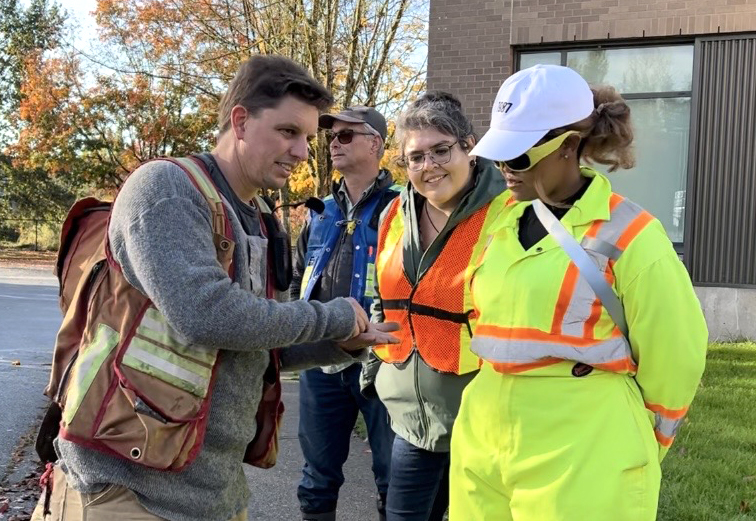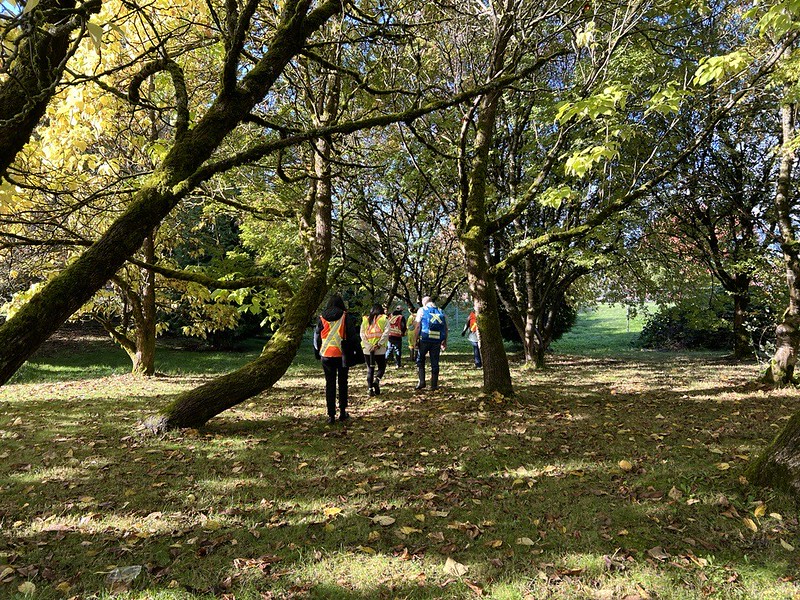Local First Nations representatives and archaeology consultants, joined by Kwantlen Polytechnic University (KPU) students and employees, recently surveyed university-owned sites in a search for evidence of past land use.
Archaeological overview assessments were initiated at KPU campuses in Surrey, Langley, Cloverdale and Richmond, as well as a site owned by the university at Paterson Park in Delta. The lands were assessed for the potential presence of archeological materials or deposits.
“We’re surveying areas of the campus where we think there might be archaeological potential,” says Brendan Gray, an archaeologist with Cordillera Archaeology. “We’re looking for surface exposures of fire altered rock, artifacts, pit features or any interesting rock formations which might show that there was previous land use here before the university, before our settlers were here.”
This initiative aims to honour and integrate the traditional knowledge and values of local Indigenous communities, supporting KPU’s commitment to reconciliation and collaboration with First Nations. By uncovering evidence of past land use, the assessments foster a deeper understanding of the land’s historical significance, contribute to a respectful acknowledgment of the region’s heritage and promote informed stewardship of the campus environment.
The assessments are being completed by KPU, the KPU Communities Trust and the Seyem Qwantlen Resources Limited Partnership. This project is a component of KPU and the KPU Communities Trust’s ongoing partnership with the xwməθkwəyə̓ m (Musqueam), qi̓ cə̓ y̓ (Katzie), SEMYOME (Semiahmoo), scə̓ waθən (Tsawwassen), kwikwəƛə̓ m (Kwikwetlem), qiqéyt (Qayqayt) and qw̓ ɑ:nƛ̓ ə̓ n̓ (Kwantlen) First Nations.
“This work is vital in helping KPU along the path to reconciliation and will offer us a better understanding of potential areas of traditional use,” says Brent Elliott, Associate Vice-President of Campus and Community Planning at KPU. “KPU is committed to working alongside local Indigenous communities to ensure traditional knowledge and values are represented in the assessments.”
“This is a great opportunity to honour and learn about the traditional knowledge and values of local Indigenous communities,” says Helen Lui, Director of Development of KPU Communities Trust. “This is an important foundation and commitment to reconciliation, and critical to our collaboration with First Nations in envisioning possible futures for our campuses.”

“An archaeological overview assessment is part of a standard approach to responsible management of archaeological and cultural heritage,” says Brian Pegg, an anthropology instructor at KPU. “It helps KPU to be compliant with the UN Declaration of the Rights of Indigenous Peoples, as it provides detailed information to local Indigenous communities about any archaeological or cultural sites that may be present at KPU. Undertaking an overview assessment shows KPU is taking responsibility for its land stewardship into the future.”
This is the first stage of assessment and could lead to the need for more intensive archaeological impact assessments in the future.
The KPU Communities Trust is a wholly owned subsidiary of the university, created in 2022 to lead and facilitate the delivery of non-academic developments and revenue generating activities for the benefit of KPU. The KPU Communities Trust seeks to empower and inspire transformative change by building better and more sustainable communities, fostering meaningful engagement with the broader community, championing First Nations reconciliation and creating comfortable and innovative spaces that seamlessly bridge the university with its neighbours.
